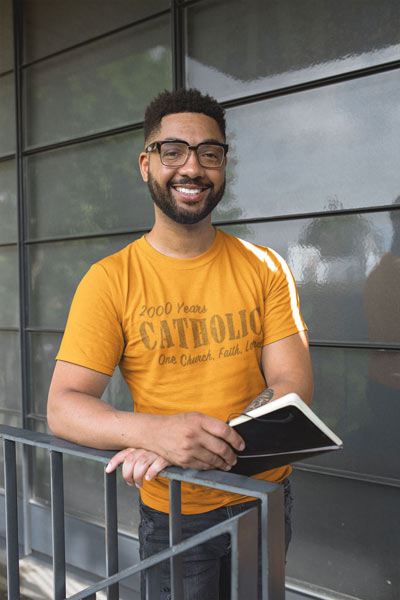The goal of Lent is to experience a more intimate, personal relationship of communion with Jesus Christ.
By Deacon Frederick Bartels
19 February 2018
Yet even now, says the Lord, return to me with all your heart, with fasting, with weeping, and with mourning; rend your hearts and not your clothing. Return to the Lord, your God, for he is gracious and merciful, slow to anger, and abounding in steadfast love, and relents from punishing. (Joel 2:12-13)
Lent is the sacred season of drawing nearer to God and experiencing greater union with God through its penitential activities. This is accomplished by faithfully practicing the three disciplines of Lent: prayer, fasting, and almsgiving. Here are some simple suggestions anyone can put into practice to make their Lent more fruitful:
1. Prayer:
A. Get into prayer: If you’re not yet doing so, participate in Holy Mass each Sunday during Lent. Mass is the highest form of Christian prayer. During the sacred liturgy, our redemption is carried out as Vatican II taught. Be sure to attend the sacrament of confession before receiving the Eucharist if you’ve intentionally neglected participation in the Sunday Eucharist (Catholics are obliged by the law of the Church and the Third Commandment to publicly worship the Tripersonal God on the Lord’s Day—Sunday—and all other holy days of obligation at Mass. Refusal to do so is at the least gravely sinful and possibly mortally sinful. One must not receive the Eucharist if conscious of having intentionally and knowingly committed grave sin without first being reconciled to God, Church, and others through reception of the sacrament of Penance).
If we reject the Mass, we’re rejecting the saving Paschal Mystery of Christ. If we are uninterested in participating in the Mass, we’re saying to Jesus, “I’m unconcerned about the merits of your saving passion, death and resurrection which are applied to me in the Holy Mass. I’m uninterested and unmoved by the suffering you voluntarily underwent for the sake of my eternal salvation.” To reject the Mass is to slap Jesus in the face while he hangs on the cross.
B. Set aside 15 minutes of structured prayer time each day. Engage in the ancient prayer tradition of Lectio Divina.
C. Repeat this prayer of contrition often throughout the day: “Lord Jesus Christ, Son of God, have mercy on me, a sinner.”
2. Fasting:
A. Get into fasting: Catholics ages 18 through 59 are obliged by the law of the Church to fast on Ash Wednesday and Good Friday. Catholics age 14 and above are obliged to abstain from flesh-meat on all Fridays during Lent. Unless you have a serious reason for not doing so (such as a medical reason), apply yourself with dedication to meeting these obligations.
Learn more about the Church’s laws of fasting and abstinence.
B. Consider going beyond the minimums. Contrary to popular opinion, God desires us to prove our love for him by voluntarily enduring some type of suffering for the sake of our love for God. Prove your love for God by forcing your body into submission and going without what you physically desire as a form of penance for your sins and the sins of others. Voluntary penance done in the name of Christ is itself a participation in his voluntary, saving passion and death. It’s a way of proving to Christ that you’re truly interested in joining in union with him. Fasting puts words into action. To be sure, God notices your commitment.
C. Provided you’re healthy and have no medical prohibitions against fasting, try a water fast for about 24 hours. This can be accomplished by eating a meal in the late afternoon and going without food until the afternoon of the next day. A caveat: be sure this poses no health risks for you by consulting a doctor knowledgeable about (and supportive of) fasting.
Fast and watch the graces flow!
3. Almsgiving:
A. Get into providing for the poor: This Lent, make it a point to contribute to those in need financially if at all possible and/or physically as well, such as engaging in a discipleship ministry at your local soup kitchen. Assisting the poor for the love of God and neighbor is called charity or Christian love. Doing so builds holiness and reduces pride and selfishness. It’s interesting that people seem to think Pope Francis invented the idea of the Church at service to the poor. The fact is, however, the Church has always insisted on caring for those in need. Your salvation depends on love of neighbor (see Mt 25: 31 ff).
B. Sponsor a child through a Catholic relief agency. A small donation each month of under twenty dollars can provide a child in a 3rd or 4th world nation with food and water. Make up a hand-out bag with some jerky or snacks in it to give the poor asking for assistance on a street corner.
C. Spend some time with someone in prison, in a nursing home, or a shut-in who cannot leave their home.
In summary:
You may not be able to practice everything listed in these suggestions. However, everyone can do some of them. It’s important not to set them aside or ignore them. Do you want your life to be different? Enter into Lent. Do you want to experience the happiness that only God can give, which is leagues above any kind of earthly pleasure? If so, it’s necessary to, with the assistance of God’s grace, apply yourself with determination and persistence to living out the sacred season of Lent to the fullest extent possible.
Lent is like a holy training ground. It cultivates our hearts and minds, it prepares our bodies and builds self-mastery, and it enriches us spiritually in preparation for more fully and intimately receiving our Lord on Easter Sunday, the Day of Christ’s resurrection from the dead to new life in the Spirit. Lent is the season in which you’re called to prove your love for Christ. It’s opposed to lip-service, apathy, lukewarmness, and indifference. Lent invites you to self-entrustment, dedication, commitment, and self-abandonment to God who is perfect and absolute Love, Truth, Beauty, and Goodness Itself.
The goal of Lent is personal, intimate communion with Christ. There’s no sacrifice too great for such a gift of divine Love. Give yourself over to Christ and he will give himself over to you. It’s a life-altering experience.

Deacon Frederick Bartels is a member of the Catholic clergy who serves the Church in the diocese of Pueblo. He holds an MA in Theology and Educational Ministry, and is a Catholic educator, public speaker, and evangelist who strives to infuse culture with the saving principles of the gospel. For more, visit YouTube, iTunes and Twitter.





Leave a Reply